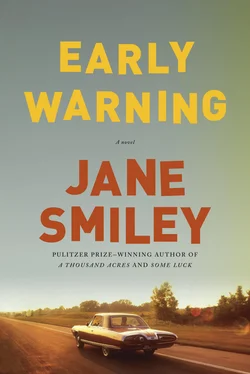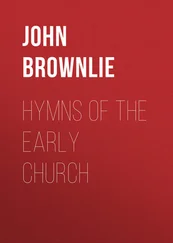Jane Smiley - Early Warning
Здесь есть возможность читать онлайн «Jane Smiley - Early Warning» весь текст электронной книги совершенно бесплатно (целиком полную версию без сокращений). В некоторых случаях можно слушать аудио, скачать через торрент в формате fb2 и присутствует краткое содержание. Год выпуска: 2015, Издательство: Knopf, Жанр: Современная проза, на английском языке. Описание произведения, (предисловие) а так же отзывы посетителей доступны на портале библиотеки ЛибКат.
- Название:Early Warning
- Автор:
- Издательство:Knopf
- Жанр:
- Год:2015
- ISBN:нет данных
- Рейтинг книги:5 / 5. Голосов: 1
-
Избранное:Добавить в избранное
- Отзывы:
-
Ваша оценка:
- 100
- 1
- 2
- 3
- 4
- 5
Early Warning: краткое содержание, описание и аннотация
Предлагаем к чтению аннотацию, описание, краткое содержание или предисловие (зависит от того, что написал сам автор книги «Early Warning»). Если вы не нашли необходимую информацию о книге — напишите в комментариях, мы постараемся отыскать её.
, a national best seller published to rave reviews from coast to coast.
Early Warning — читать онлайн бесплатно полную книгу (весь текст) целиком
Ниже представлен текст книги, разбитый по страницам. Система сохранения места последней прочитанной страницы, позволяет с удобством читать онлайн бесплатно книгу «Early Warning», без необходимости каждый раз заново искать на чём Вы остановились. Поставьте закладку, и сможете в любой момент перейти на страницу, на которой закончили чтение.
Интервал:
Закладка:
Her first mistake today had been to look at the paper even though she hated Reagan. She had been suspicious of Reagan from the beginning. In California, he had extended the right of public workers to strike, but he had fired the air-traffic controllers when they struck, showing his true colors — born-again union buster. But more than Reagan, she hated his advisers: James Watt, made secretary of the interior specifically to destroy that very interior. She hated Anne Gorsuch, and she hated Rita Lavelle (now, thank goodness, fired). In her opinion, Rita Lavelle was not the bad apple, she was the open sore that indicates the underlying infection, and the underlying infection, in the Reagan administration, was the drive to suck as much out of the ground as possible and make a few people as rich as they could be. She’d heard that Watt said something about Jesus returning soon, so what did the earth matter — it was there to be put to the use of man, anyway. This was a sentiment people from places like Wyoming often expressed. It was a sentiment the Perronis adhered to, and it was a sentiment profoundly allied to another sentiment — that no one was going to tell a Perroni what to do. If someone tried, that person might get shot. It was not an Iowa sentiment; people in Oakland and Berkeley, who worked, like Eloise did, in co-ops and on local weeklies, laughed at this sentiment, but Eloise did not, having talked to Mrs. Perroni, who was if anything harder around the eyes and more uncompromising than Mr. Perroni. A hundred thousand acres! The hundred thousand acres owed them something, and Mrs. Perroni was going to make it pay. After Eloise looked at the paper, these feelings had rolled around in her head all day, and because the weather was so bad, she couldn’t get out and take a walk away from them.
She had sold her car. Even Rosa didn’t know she had sold the car. But what happened was, she had fallen into the habit of not turning around to back up — her neck and her shoulders hurt too much when she turned around. She had carefully looked in all three mirrors, left, right, center, and she had done so three times each. She knew that there was nothing behind her. Except that there was something. She hit it, felt it drag, heard the sound of it scraping the pavement. In her panic, she touched the accelerator rather than the brake, and bumped out into the street. Only then had she stopped, turned off the car, leapt out, and rushed around to see one of those plastic tricycles toddlers rode these days — a Big Wheel or something, red and yellow, and fortunately without its toddler. Maybe it had rolled down the street from a neighbor’s house, since the toddler was nowhere. But Eloise had been so upset that she’d gone back in the house and lain on the couch for an hour, then called the Ford dealer to find out what she could get for her car, only four years old and with thirty-four thousand miles on it. She would not drive it again; the representative from the dealership came and got it the next day, and she was relieved to see it go.
It was no big deal to be without the car — she could rent her driveway for fifty dollars a month to her neighbor, who had three cars. She was a good walker, good enough to get to the co-op if she took her time and pushed a little trolley. And the co-op was next to the drugstore, and the drugstore was next to the clinic, and so on and so forth. It was manageable. But if she asked someone to drive her one more time to Drakes Bay, a couple of hours, the purest place in California, then could she walk the beach in her own time, and in total solitude make up her mind?
And what was she making up her mind about? And who cared? And why did she still care? Rosa had asked her this question this morning, when she called to report on conditions in Big Sur (Highway 1 was out again, but they were fine). Rosa was Eloise’s principal Buddhist, though she didn’t call herself that. If you asked in a mild tone of voice that didn’t imply a single thing (a tone of voice Eloise could rarely manage) how Rosa viewed her adult life, she would talk about phases, old mistaken desires that had been outgrown or shucked off. She “made no judgments” (except, of course, of Eloise), “had no desires” (except that Eloise stop harassing her), and “took things as they came” (except remarks by Eloise that sometimes caused them to be not on speaking terms for a month or two). But Eloise did make judgments, did have desires, and seemingly could not take things as they came, and she had this feeling that if she could just organize her self-contradictory thoughts she would come up with a program of why care and how to care, and, somehow, she would leave a record of this, and then her life wouldn’t be wasted. But she did not want to be someplace like Esalen, and have positive feelings and forgiveness cloud her mind. She wanted to figure out a way to get Rita Lavelle, Anne Gorsuch, and James Watt to denounce themselves, feel shame, feel regret, engage in sincere criticism and self-criticism, and then do penance.
And yet she knew at seventy-seven that it could not be done. And she also knew that James Watt, Anne Gorsuch, and Rita Lavelle would ask her, just as she asked them, was she ready to do penance for the slaughter of the Russian peasantry? For the Gulag? For the Great Leap Forward? For the takeover of Poland? For the Berlin Wall? For the Stasi? For the Khmer Rouge? For, indeed, Reverend Jones? And when they asked her this, she would squirm in her chair and say just what comrades had said year after year, decade after decade—“Mistakes were made.”
What if, Eloise thought, they were all nice people, as she herself was a nice person? What if, between gutting the Environmental Protection Agency and allowing PCBs to flood into the rivers, Anne Gorsuch worked in soup kitchens and nursed the poor? What if, between authorizations of the sale of every piece of public land in America, James Watt played with his grandchildren? Hadn’t Eloise been shocked at the murder of Lord Mountbatten, imperialist pig, whom she had detested ever since he sent Julius to his death at Dieppe? A few summers ago, when the IRA blew him up with his wife and his grandson and that poor local child, hadn’t Eloise thought first of how awful it was? Only later had she wondered whether at the final moment he’d had time for regret.
Was human nature inherently good? Eloise and Julius had disagreed on this one. Eloise had said yes, look at herself, look at her parents — if you showed people the way to do good, they would want to. Julius had said no, look at himself, look at his family — coercion was essential, eggs had to be broken. That was human nature. He thought she was naïve; she thought he was bad-tempered; neither of them saw the other one as the other one saw himself, herself.
Eloise went to the kitchen. Assam? Constant Comment? Mint? She made a cup of each and set them in a row on her coffee table. Finally, finally, finally, when she turned on the show, her show, Hill Street Blues , and saw that familiar attractive Sergeant Esterhaus starting the day’s shift at the mysterious precinct station (Eloise always imagined Chicago), she forgot, more or less, about Hobbes and Locke and her aches and pains and the rain that had been going on for days. Her brain remained a pleasant blank for the rest of the night — while she put her cups in the sink, while she made sure the doors were locked and checked the windows in the sunporch, while she brushed her teeth and put on her nightgown and straightened her bedclothes, which hadn’t been made by anyone that morning after she got up. By her, that was. Her book was by her bed —Memoirs of Hecate County. Hard to believe it had been censored, but it had. She was having a little trouble getting through it, though. She decided not to disturb her blankness by trying again tonight. She got into bed.
Читать дальшеИнтервал:
Закладка:
Похожие книги на «Early Warning»
Представляем Вашему вниманию похожие книги на «Early Warning» списком для выбора. Мы отобрали схожую по названию и смыслу литературу в надежде предоставить читателям больше вариантов отыскать новые, интересные, ещё непрочитанные произведения.
Обсуждение, отзывы о книге «Early Warning» и просто собственные мнения читателей. Оставьте ваши комментарии, напишите, что Вы думаете о произведении, его смысле или главных героях. Укажите что конкретно понравилось, а что нет, и почему Вы так считаете.











